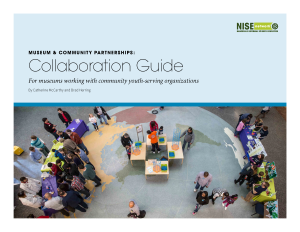NISE Network Product Development Process
NISE Network educational materials are created through an iterative, collaborative process that involves scientists with expertise in the content area, professionals in the field of informal science education, and evaluation with targeted public audiences. This process helps to ensure that our programs, exhibits, and other products are scientifically accurate, represent best practices in educational product development, and are safe, effective experiences for learners of all ages.
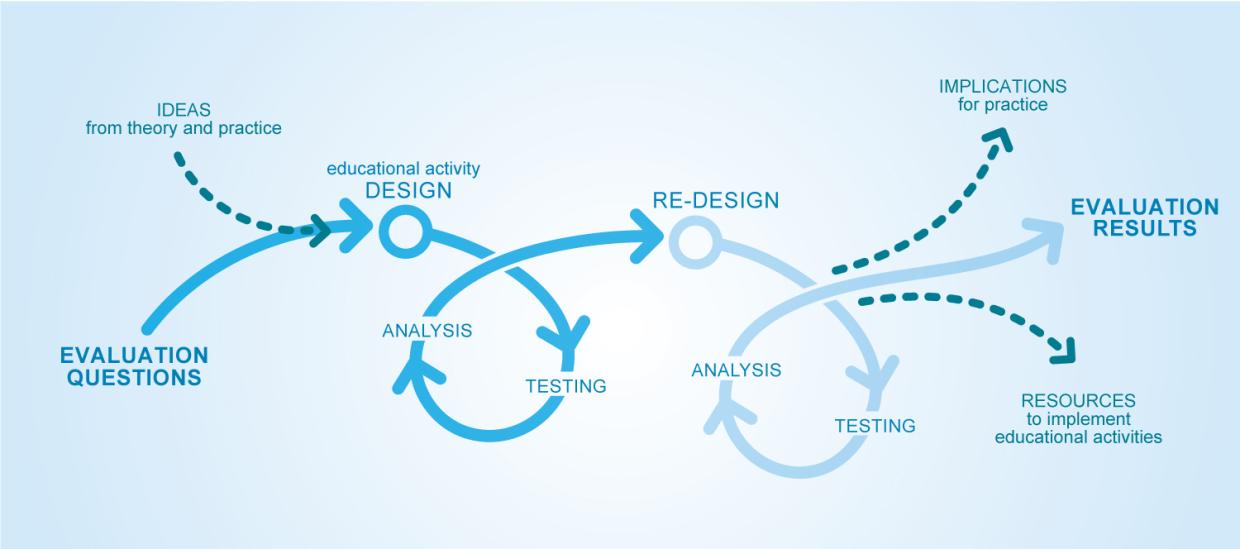
Development Process
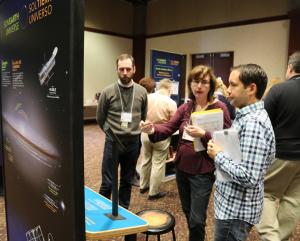
Scientist review
- Scientists are involved throughout the creation of NISE Net products, from the early conceptual development through prototyping and final review. Scientists help us to find interesting ideas and present them accurately and effectively. They also help us to communicate the excitement of this field of emerging science, and give it a human face. All products developed by the network are reviewed by a scientist with expertise in the content area before they are distributed.
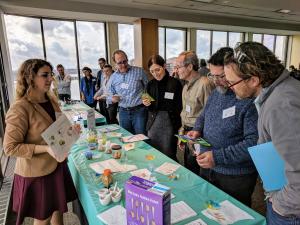
Peer review
- NISE Network development teams include educators, exhibit developers, and other professionals from museums across the country. We work together to make sure our educational products achieve their educational goals, are well-crafted, and represent best practices. Our collaborative development process also helps to create new knowledge to advance the field of informal science education and builds capacity at partner organizations. NISE Net products all go through extensive peer review during development.
Examples of topics covered during peer review include:- Content, messages, and learning objectives
- Program format and appropriateness for setting and target audience
- Engagement and relevance for target audience
- Best practices for program design, delivery, and implementation
- Inclusive audiences design approach to effectively engage underserved and underrepresented audiences, including girls, bilingual audiences, and persons with disabilities
- Universal design approach to create educational products that are as accessible as possible for museum visitors with a broad range of abilities and disabilities
- Safety and suggested risk mitigation
- Professional learning facilitation and training resources for staff and volunteers
- Ease of sharing and reproducibility to allow for easy editing and adaptation for different audiences
- Cost and access to consumable materials
- Documentation of product
- Appropriate permissions, credits, and acknowledgement
- NISE Network development teams include educators, exhibit developers, and other professionals from museums across the country. We work together to make sure our educational products achieve their educational goals, are well-crafted, and represent best practices. Our collaborative development process also helps to create new knowledge to advance the field of informal science education and builds capacity at partner organizations. NISE Net products all go through extensive peer review during development.
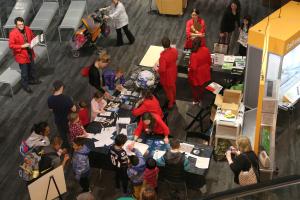
Visitor evaluation
- NISE Network products for museum visitors are prototyped and evaluated with their target audience as an integral part of the development process. Formative evaluation and Team-Based Inquiry approaches help ensure that programs, exhibits, and other visitor experiences are accessible, engaging, and educationally effective. Products go through several rounds of evaluation and improvement before they are distributed.
- Learn more about Evaluation and Research
- Learn more about Team-Based Inquiry (evaluation capacity building tool)
- Learn more about Evaluation Tools
- NISE Network products for museum visitors are prototyped and evaluated with their target audience as an integral part of the development process. Formative evaluation and Team-Based Inquiry approaches help ensure that programs, exhibits, and other visitor experiences are accessible, engaging, and educationally effective. Products go through several rounds of evaluation and improvement before they are distributed.
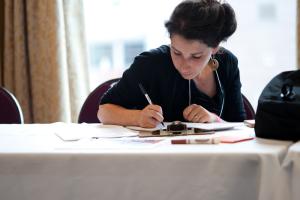
Partner feedback
- The NISE Network regularly solicits partner input and feedback about our educational materials to ensure future public engagement materials and professional learning resources are useful for our partners.
- The NISE Network regularly solicits partner input and feedback about our educational materials to ensure future public engagement materials and professional learning resources are useful for our partners.
Design, Content Frameworks, and Audiences

Educational Products are Designed for Sharing and Adaptation
- Products are designed from the beginning to be easily edited and adapted for different audiences.
- NISE Network uses a Creative Commons Attribution Non-Commercial Share Alike license.
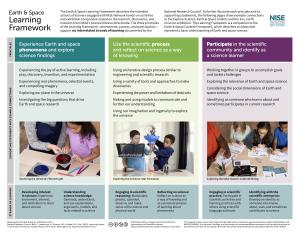
Content Maps and Learning Frameworks
- The NISE Network has developed learning frameworks and content maps that articulate the key ideas for our educational products, including programs, exhibits, and media experiences.
- Earth & Space Science
- Earth & Space Learning and Content Frameworks: This content framework and learning framework are professional learning tools for informal educators engaging the public with the hands-on activities in the Explore Science: Earth & Space toolkits and the Sun, Earth, Universe exhibition.
- Nanoscale Science
- The Nanoscale Science Informal Learning Experiences: NISE Network Content Map articulates the key ideas for our educational products, including programs, exhibits, and media experiences. It presents the content knowledge the network has identified as the most important for engaging the public in learning about nanoscale science, engineering, and technology.
- Engaging the Public in Nano Key Concepts provides an overview of key concepts in nanoscale science, engineering, and technology, as identified by the NISE Network.
- Nanoscale Informal Learning Experiences: NISE Network Learning Framework: This nanoscale science learning framework tool indicates how our educational experiences support the six interrelated strands of learning documented by the National Research Council.
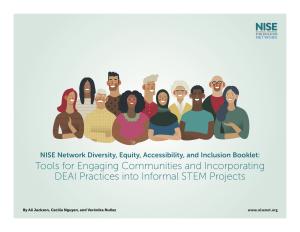
Inclusive Audiences
- Informal STEM education is designed for everyone! NISE Network creates materials that educators and STEM professionals can share with lifelong learners of all ages and backgrounds.
- Products are designed with an inclusive audiences approach using Universal Design principles.
- Inclusive audience resources: https://www.nisenet.org/Audiences
many ressources on different aspects of inclusive - Making Earth & Space Science More Relevant and Inclusive
- Inclusive audience resources: https://www.nisenet.org/Audiences
Professional Learning Resources about the Development Process
The Professional Learning section of the website provides resources to help all museum professionals use a similar approach to developing educational experiences related to current science. There, you can find guides for connecting museums with scientists who are willing to assist in program and exhibit development; tools and guidelines to support the development and review of programs, exhibits, and other experiences; and tools for evaluating them with visitors.

Presentation about the development process
- Space and Earth Informal STEM Education Project Development Process Presenation (2022)
Slides presented to the NASA Science Activation group about the project's development process focused on scientist and peer review, visitor evaluation, and partner feedback.
- Space and Earth Informal STEM Education Project Development Process Presenation (2022)
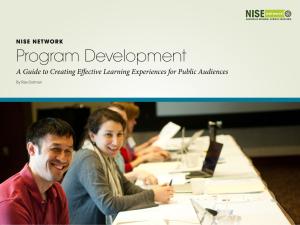
Developing effective programs and activities
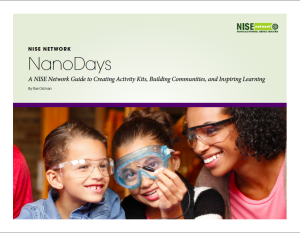
Developing activity kits
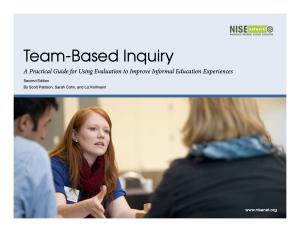
Evaluation capacity building tools
- Professional learning and capacity building evaluation tools for educators to improve their products and practices with the intent to more effectively engage public and professional audiences.
- Learn more about Team-Based Inquiry (evaluation capacity building tool)
- Learn more about Evaluation Tools
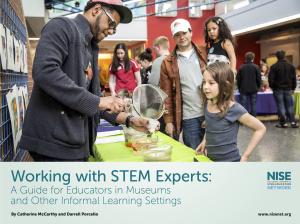
- Working with STEM Experts
- Working with STEM Experts: A Guide for Educators in Museums and Other Informal Learning Settings
Professional learning guide includes suggestions for working with experts on review processes and resources for finding experts.
- Working with STEM Experts: A Guide for Educators in Museums and Other Informal Learning Settings
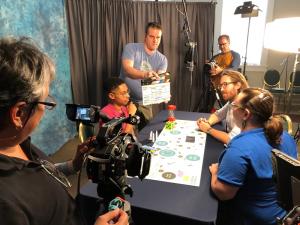
Making training videos
- Most NISE Network activities have training videos that focus on facilitation tips, modeling an interaction, and provide some background content.
Examples of training videos: https://www.nisenet.org/training-videos - Online workshop recording about how to make effective training videos (one hour) (recorded 2015)
Videos 101 - Tips, Tricks, and Strategies for Small-Scale to Large-Scale Video Production - How to make a how-to instructional training video (2 minutes) (2009)
- Most NISE Network activities have training videos that focus on facilitation tips, modeling an interaction, and provide some background content.
More Professional Learning Resources
- You can find many more professional learning guides on on a wide range of educational program development and implementation topics including evaluation capacity building, Universal Design, safety, games, public engagement, and more
https://www.nisenet.org/pd

